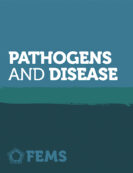FEMS Microbiology Ecology Poster Prize: Jing Zhao & Yingxin Li
3rd International Symposium on Sponge Microbiology Poster Prize, 2018

The 3rd International Symposium on Sponge Microbiology (ISSM) took place in Shanghai, China, from 25-29 October 2018. FEMS Microbiology Ecology awarded prizes to the two best poster presentations. There was also a Virtual Special Issue published for this conference.
Read interviews with the winners of the Poster Prize below.
Jing Zhao
What is your current position, and what was your scientific journey to get there?
I am an associate professor of Xiamen university, China. The major focus of my research is the investigation of symbiotic bacteria associated with marine sponges and the application of bioactive compounds from marine microorganisms.”
Could you describe the research your poster covered?
Sponge contains a rich variety of commensal microbial communities as the oldest and most primitive multicellular organism. However, these microbial functions in the development stage of host are less known.
In this study, high-throughput sequencing and transmission electron microscopy were used to describe a detailed profile of associated microbiomes at 7 life stages of sponge Tedania sp. Among these microbial communities, the symbiotic Bacteroidetes sharply increased in competent larvae before larval settlement.
Afterwards, a series of experiments were set up to verify that Bacteroides could effectively promote larval settlement of Tedania sp.”
What do you hope to focus your research on in the future?
In the future, we will further study the promoting mechanism of associated microbes on the larval sponge settlement and the function of symbiotic microbial community with sponges.”
Yingxin Li
What is your current position, and what was your scientific journey to get there?
I studied Microbial and Biochemical Pharmacy at China Pharmaceutical University, earning my Master`s Degree in 2013. Currently, I am a Ph.D. student under the guidance of Prof. Zhiyong Li at Shanghai Jiao Tong University, where my research focuses upon secondary metabolites from marine sponge-associated microorganisms by activating their silent biosynthetic gene clusters and transformation of related metabolites.”
Could you describe the research your poster covered?
Borrelidin (BN), a macrolide natural product, exhibits a broad range of biological activities, including antibacterial, antifungal, antiviral, and notable antimalarial activities as well as the inhibition of multiple tumor cell lines.
However, utilization of BN has been hampered by its high cytotoxicity to normal cells, resulting in a narrow therapeutic index. Recent studies indicated that both BN and BC194 showed strong abilities to inhibit threonyl-tRNA synthetase (TARS)-dependent angiogenesis at sub-toxic levels, but exhibited conspicuously less toxicity toward endothelial cells than BN and retained almost equal ability to inhibit angiogenesis. However, the production of BC194, to the best of our knowledge, has only been reported via mutasynthesis. In previous exploration, I found BN could be produced by Streptomyces rochei MB037 derived from sponge Dysidea arenaria we collected from the South China Sea.
Here, in my poster, the precursor-directed biosynthesis and purification of BC194 by this marine BN-producing strain were surveyed. The effects of possible inhibitor of 3,4-dihydroxyphenylacetate 2,3-dioxygenase (DHPAO), trans-1,2-CBDA, and macroporous resin on the precursor-directed biosynthesis of BC194 were clarified.
Finally, we provided an alternative method for the production and purification of BC194 by this BN-producing strains.”
What do you hope to focus your research on in the future?
In the future, I would like to focus on secondary metabolites with diverse bioactivities and their biosynthetic pathways from sponge-associated microbes, and the roles of secondary metabolites from sponge-associated microbes played in the symbiotic relationships between sponge and their microbes.”
All but one of the FEMS journals are now fully open access (OA), with one journal, FEMS Microbiology Letters remaining a subscription journal with free-to-publish and OA options. Open access is key to supporting the FEMS mission of disseminating high quality research as widely as possible: when high quality, peer reviewed sound science is open access, anyone, anywhere in the world with an internet connection, can read it.







